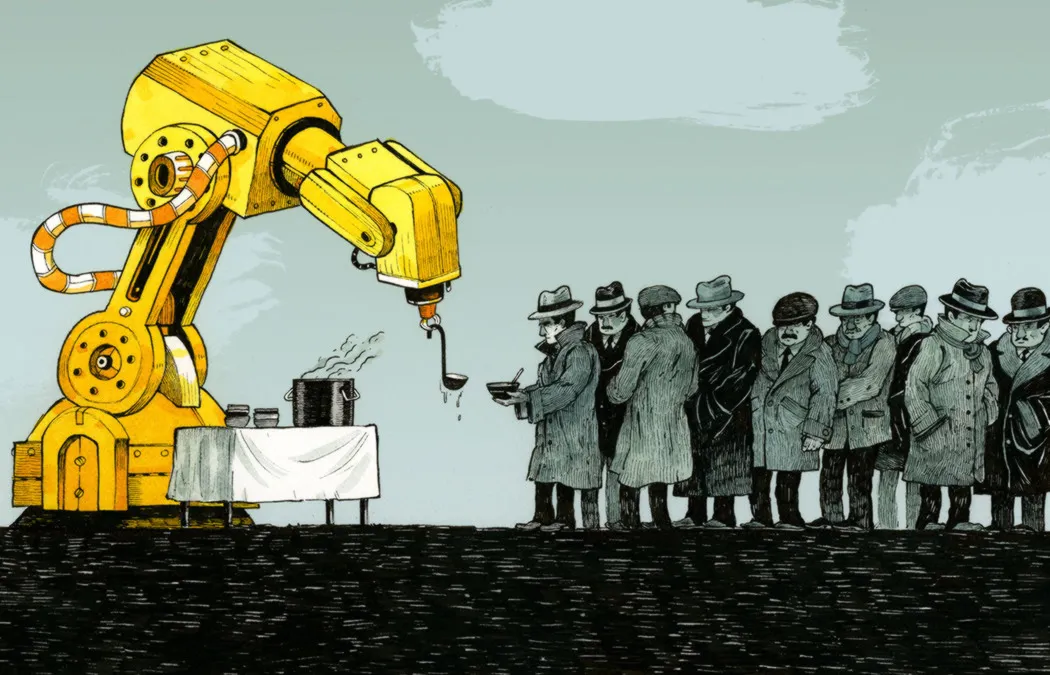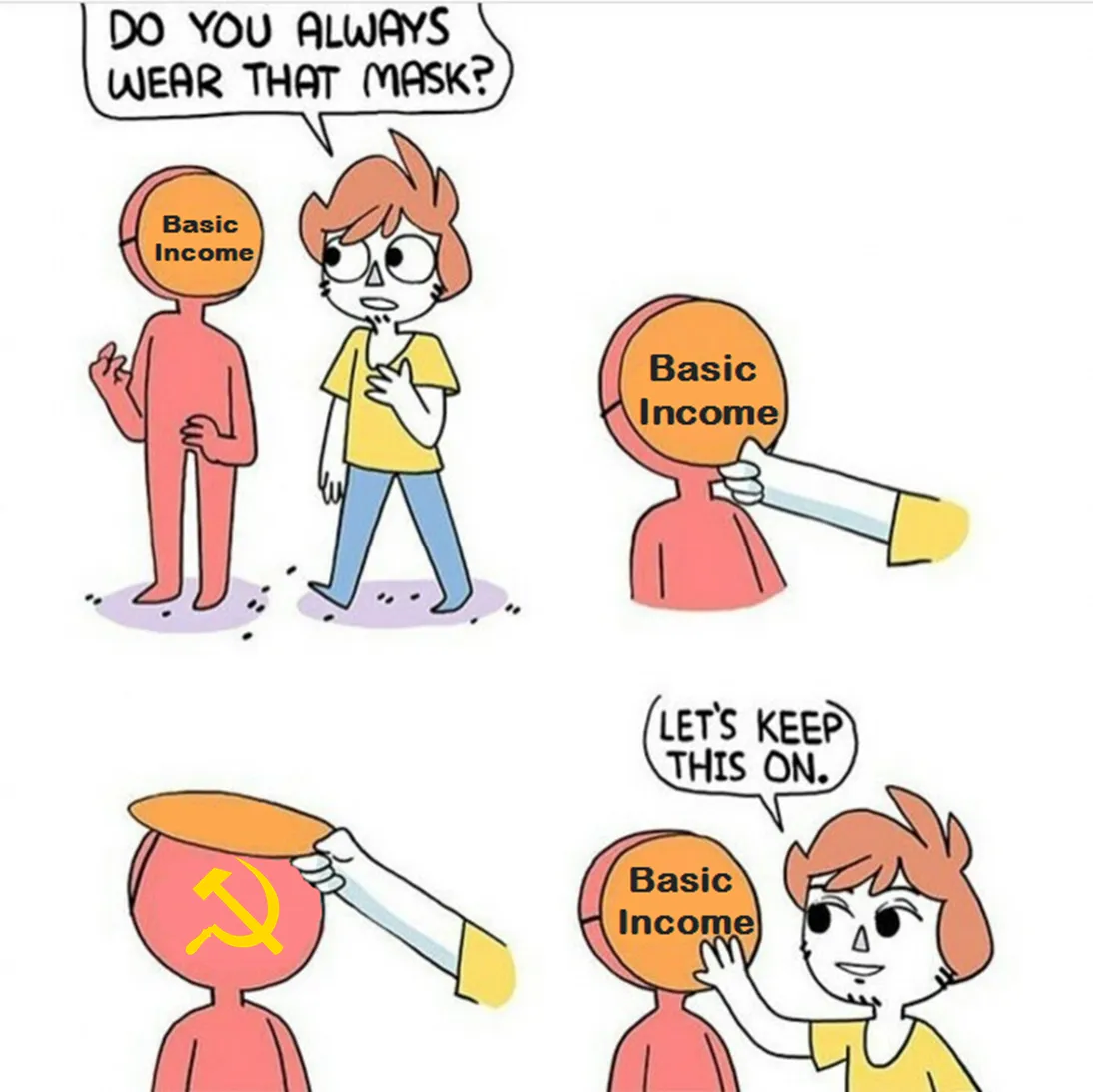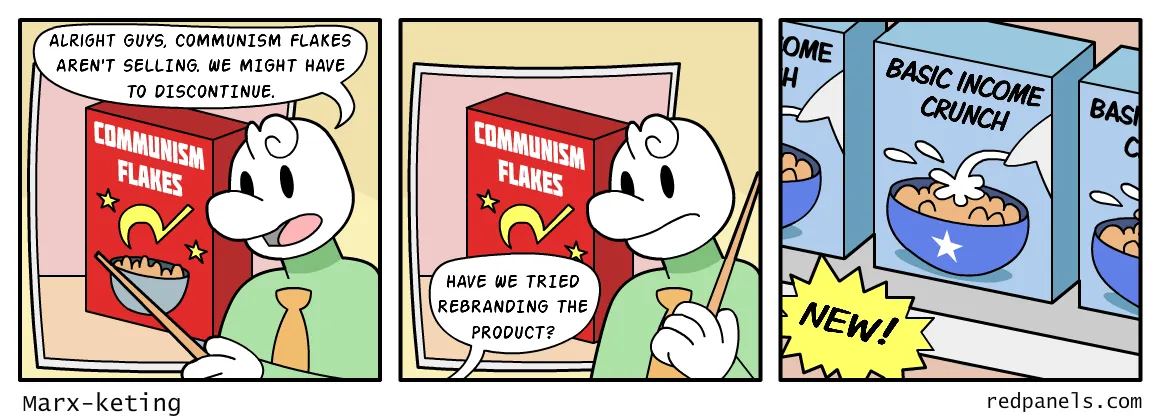
Throughout the months that I have been in Steemit, I have met several times with different posts of different authors, who have different ideologies, in which explains an approach that aims to make use of a Universal Basic Income with the goal of both eradicating poverty, and reducing the dependence of people to a job.
Although the reasons are very good, I am afraid that the staging of a concept such as the Universal Basic Income would not be beneficial at all, first because it would not achieve its objective (eliminate poverty and dependence on a job) and second, because the only thing that would be achieved with such a measure is to destroy the market, distort the price system and generate inflation, which will probably lead to an increase in poverty and dependence on jobs.
But since I know that the concept of Universal Basic Income is quite pleasant for many of the people I have met in Steemit, I will explain the main reasons why such a project would fail, however, I will also try to provide some possible alternatives.
Well, first we must understand that the Universal Basic Income is a subsidy that all people, without any kind of distinction, receive regularly, either from a public institution, or through the use of private mechanisms.
Under this concept there is no requirement to perceive the subsidy allocation, therefore, neither age, gender, race, origin, degree of study, distinction between civil and military, foreign and native or any other, they are not an impediment to receiving the income.
But then, this multicultural paradise in which poverty and dependence on work are eradicated, presents the first question:
Where would you get the money to pay everyone this assignment?
Well, there are two main forms and they are quite well known to all of you: Taxes and Monetary Issuance.
Taxes: Through this mechanism all those who perceive alternative earnings to the Universal Basic Income should contribute voluntarily, or in their absence of mandatory form, with the money necessary to maintain the system, that is, the Universal Basic Income would be accompanied by a tax that would be charged on the productive factors.
Monetary Issuance: Through this model, the body responsible for monetary policy would be responsible for issuing new money, with the objective that it be used to finance the basic income.
Both cases have the same problem, and that problem is basically inflation.
Let's see, what is inflation? Well, I will reuse the definition I used in a previous publication: Inflation is the excess of money supply, so simple, if there is more money in circulation than the one demanded by the suppliers of goods and services, inflation is generated.
In both cases, whether the funds are generated through new monetary issuance, or if they are collected through taxes, the amount of money in the hands of people increases, so that the demand for goods and services will increase, which will inevitably translate in an increase of the prices, so in the same measure that the Universal Basic Income increases, the level of the prices will increase, therefore, the positive effect that this income should have is totally annulled by the inflation, at the same time bringing with it the inflationary problem, and everything that entails.
Well, some of you will say: Hey @vieira, I understand that the issuance of new money generates inflation, but the government collects taxes frequently and also spends that money, does not that generate inflation? What would be the problem with the Universal Basic Income?
The difference between public spending and private spending is very simple, when spending money is about, the State does not act in the same way that acts as the set of people that make up the body of a society, the State has very particular needs, and spend their money on different things, so the increase in demand is only generated in very remote fields, however, when the increase in demand is forced by the people and not by the State, the money is usually spent in products and services of first necessity, which subsequently brings with it the increase of all prices.
Such is the story of Mansa Musa, who for those who don't know, it was a king of the Mali Empire known for being extremely wealthy, according to estimates, his wealth was superior to that of Jeff Bezos today, founder and CEO of Amazon. Mansa Musa was known to be very generous, he paid good amounts of gold to those who served, in addition to trying to help the poor by making donations in gold, however, things did not go as he had planned, because his generosity was such, that gold lost all its value in cities like Cairo, Medina and Mecca, and because this mineral was used as a means of exchange, since fiat money did not exist yet, inflation reached the clouds.
This case is very important, because it leaves the problem in perfect evidence. People often believe that fiduciary money is based on trust and that instead gold inherently has a value, therefore, they think that the problem of inflation is due solely to the issuance of new money, forgetting that distribution is also important. The problem that arose in the cities affected by the generosity of Mansa Musa, would be the same problem that would happen in the case of implementing something like the Universal Basic Income in modern society, why? Because when the means of exchange is abundant, it automatically loses its value with respect to the goods that are traded with it.
This happens because the real wealth is not what the millionaires have in a bank account, nor is the gold bars that are stored in a vault, wealth are goods and services that can be used by consumers, and this wealth is directly proportional to the production capacity of the company. Increase the amount of money but maintain the same level of production, the only thing you will get is that the money loses value, that is; inflation, moreover, it is more likely that the level of production will decrease, because by establishing a regime such as the Universal Basic Income many individuals would decide not to participate actively in the economy.
In spite of all the faults that this model presents, I have been able to find two ways in which under a purely theoretical and superficial logic it can work. These two forms are also known to you, they are mainly: Socialism and Communism.
I must be honest, I started writing this publication with the aim of describing the fundamental flaws that a model like the "Universal Basic Income" would have, however, as I went deeper into my analysis I noticed something that I had not noticed before, and that is that as all roads lead to Rome, all subsidies lead to communism, and universal basic income is no exception, if you want to see proof of this, just open the book written by Karl Marx and then you will see that the principles that are at the base of UBI are the same under which communism is sustained.
So what was a publication with which he pretended to kindly discard the concept of Universal Basic Income, has been reduced to the same as always, my personal struggle against communism and its innumerable mutations.
Why do I say this? let's see...

Universal Basic Income - Socialist version
As we have established that the problem of wealth is not due to the small amount of money in circulation, but is due to the shortage of goods and services, then we can determine that there are two possible solutions in which we could implement a Universal Basic Income.
The first one would be a model in which the State would give the Universal Basic Income, but in turn, it should have the capacity to anticipate the way in which consumers would spend their money, and to be able to produce the sufficient quantity of goods and services demanded, in the quality demanded, in the time and place demanded, with the objective that the increase of the demand generated by the consumers does not exceed the total supply of goods and services required.
So in these conditions the, suppose "People's Universal Basic Income Office", should have several qualities:
Have the ability to know previously what, where, in what quantity, in what quality, and when goods and services will be demanded.
Have the ability to produce and distribute goods and services to meet the greatest demand never seen before, because when dealing with a Universal Income we all become claimants.
All this supposing that the market continues in operation, that is to say, that the State does not take control of the means of production. So all that effort is practically impossible, dependent on the market, and probably very inefficient, it would simply be to compensate the wealth generated by the current market.

Universal Basic Income - Communist version
Under this mechanism the Universal Basic Income is not granted through a monetary allocation, but to eliminate the problem of inflation, as the paradoxical problem that represents anticipating the decisions of people, the "People's Universal Basic Income Office" would be responsible to assign goods and services directly, and not in money.
In such a way that the tax charged to the current productive factors, should be large enough to maintain the parallel industry created by the Universal Basic Income Office along with the entire distribution system.
So in practice, this would be a kind of parasitic industry, which will feed on the wealth generated in the market industry, and which would depend to a large extent on the continuous growth of the market it is destroying, because when implementing the Universal Basic Income the cost of labor increases and the incentives to work diminish, in addition, the most likely is that the market for basic goods and services eventually disappear, as they could not compete with the parasitic industry created by the new system, which would end up decreasing taxes, causing them to have to carry more weight on the shoulders of the rest of the industry.
In the end, it would be necessary to decide between eliminating the Universal Basic Income, or maintaining it at the cost of destroying the current market. The practical decision to this dilemma is easy to take, since it is easy to see that the parasite can't live on its own, so the correct option would be to eliminate the Universal Basic Income, however, the theoretical option raises another question, that practically is the same question posed by communism: Would people be willing to work exclusively to receive in return a Universal Basic Income that everyone should receive by right?
If the answer to that question is no, but you still want to implement this model, then that model will probably end up in the same way as the Soviet Union.
If the answer to that question is yes, then you simply have to put it into practice and see how it goes to the theoretical communism described by Marx, because that is what it is.
